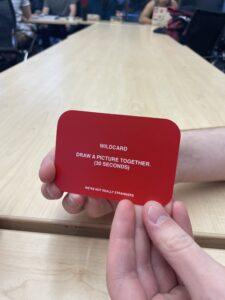For my critical play, I played “We’re Not Really Strangers” which is a getting to know you game created by Koreen Odiney. Though the title implies that the game could perhaps be used for strangers, the cards and content at hand seem targeted at adults who are somewhat close friends. For the purpose of the critical play, we played the multiple player version as opposed to the two-player version — however, we soon ran into complications. When starting out, we picked the following “wildcard”:
This proved very difficult with four players. Despite the game providing a multiplayer version, this card and various others clearly seemed aimed at two players.
The game has a very unique structure — there are three “levels.” The first is perception, the second is connection and the last is reflection. When we played, in each round, a player picks a card from the corresponding level (one or two rounds per player) and asks or answers the question according to the card. For example, one potential card is the following:
However, in reality, the rules and procedures of the game were so complicated that we misunderstood it. The deck also contains a “dig deeper” card which players can use on another player at some point in the game and the instructions manual asks for each player to write their first impressions. However, when my group played, we didn’t even realize we were meant to write first impressions. Instead, we felt like based on the presentation and branding, the game was an intuitive get to know you game and jumped in to picking cards.
I felt as though the way the game presented the formal elements made the game more constrained. The instructions also included rules on which player should start first in a round, how exactly to write the first impressions and details on who should respond to the card picked. While playing this game, I realized that scaffolding often gets in the way in “getting to know you” games. While other games such as deception or bluffing or challenge games may require scaffolding, the intention of these types of fellowship games is to strengthen relationships. I found the rules and the stress of following them getting in the way of the intention of the game.
It was almost as though the gamemakers imposed too many mechanics on the game. In other getting to know you games, the lack of mechanics is what enables players to get to know each other. The lack of mechanics is what enables the “fun” of going a level deeper with a friendship or having a vulnerable conversation. In addition to the rules, I also felt like wildcards impeded the fun. It created a dynamic of a more hassled game. The game went from vulnerable and slow to more shallow and activity-based with an instagram or other wild card.
While I did not find this game fun because of the complicated mechanics, I can imagine how it would be fun in the right scenario. This game seems intended for a long play — whereas truth or dare could end at any point, this game requires a significant amount of time. The game’s dynamics also require a significant amount of “opt-in.” All players must want the common objective of deepening relationships for a set intense amount of time. This means the game is only “fun” if you can find people who are committed and have the right level of proximity.






